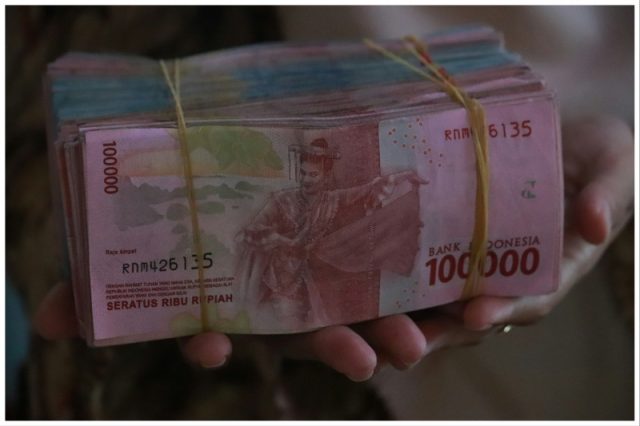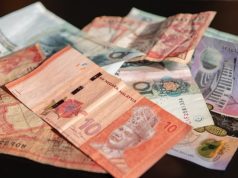- Rupiah clocks worst session in 2 weeks
- Taiwan dollar logs biggest percentage loss in 1 month
- Asian equities mixed; Taipei stocks top laggard
Asian currencies fell on Monday, with the Indonesian rupiah leading losses, as investors hesitated to make riskier bets ahead of a key U.S. inflation reading later in the week.
The Indonesian rupiah <IDR=> dipped as much as 0.7% by 0346 GMT to mark its biggest intra-day percentage decline since Aug. 27. The Malaysian ringgit <MYR=> and the Taiwanese dollar <TWD=TP> followed suit to lose as much as 0.5% each.
Investors analyzed last week’s mixed U.S. jobs data and comments from U.S. Federal Reserve officials, which suggested a weak labor market but without sufficient justification for a 50-basis-point interest rate cut. The U.S. inflation report on Wednesday will be a key indicator that could shift market expectations.
The U.S. dollar index <USD=>, which tracks the currency’s value against six major peers, rose marginally by 0.2% to 101.267. The broad MSCI emerging markets currency index <.MIEM00000CUS> was down as much as 0.3%, heading for its worst session in over two weeks.
Fakhrul Fulvian, an economist at Trimegah Securities, said Indonesia’s rupiah was under pressure from overly ambitious U.S. rate cut expectations but said expectations of lower issuance of rupiah securities by Bank Indonesia was likely to normalise the currency market.
Equities in the region traded mixed, with those in Taipei <.TWII> and Seoul <.KS11> down 1.8% and 0.8%, respectively, while shares in Manila <.PSI> and Singapore <.STI> advanced over 0.8%, each. Shares in Jakarta <.JKSE> slipped 0.7% and Thailand <.SETI> fell 0.3%.
Taiwan and South Korea’s economies are closely tied to the U.S. through significant foreign investment and strong trade ties, making them vulnerable to changes in U.S. monetary policy, which has a direct impact on their stock markets.
Thailand’s shares surged over 5% last week, extending a four-week rally, driven by improving sentiment as political instability fades and optimism grows over the incoming Vayupak Fund, a state investment fund expected to boost capital inflows.
In Malaysia, stocks <.KLSE> traded flat, although, 99 Speed Mart Retail <IPO-99SP.KL>opened higher in its stock market debut after the mini-market chain retailer raised 2.36 billion ringgit ($543 million) in the country’s biggest listing in seven years.
In China, investors are growing cautious as inflation in Southeast Asia’s largest trading partner accelerates to a six-month high, adding to pressure on the government to implement more policies to address a sluggish economy, housing downturn, joblessness, debt woes, and rising trade tensions.
Shares in Shanghai <.SSEC> slipped nearly 1%, while the yuan <CNY=CFXS> slid 0.1%.
($1 = 4.3450 ringgit)
HIGHLIGHTS:
** Indonesian 10-year benchmark yields rise 3.3 basis points to 6.89%
** Japan’s Q2 GDP growth revised down; softer consumption to test BOJ policy
| Asia stock indexes and currencies at 0432 GMT | ||||||
| COUNTRY | FX RIC | FX DAILY % | FX YTD % | INDEX | STOCKS DAILY % | STOCKS YTD % |
| Japan | <JPY=> | -0.34 | -1.19 | <.N225> | -1.30 | 7.94 |
| China | <CNY=CFXS> | -0.12 | -0.15 | <.SSEC> | -0.92 | -7.88 |
| India | <INR=IN> | +0.00 | -0.88 | <.NSEI> | -0.04 | 14.31 |
| Indonesia | <IDR=> | -0.49 | -0.26 | <.JKSE> | -0.77 | 5.35 |
| Malaysia | <MYR=> | -0.39 | +5.64 | <.KLSE> | 0.08 | 13.73 |
| Philippines | <PHP=> | -0.20 | -1.59 | <.PSI> | 0.82 | 8.41 |
| S.Korea | <KRW=KFTC> | +0.01 | -3.86 | <.KS11> | -0.47 | -4.63 |
| Singapore | <SGD=> | -0.01 | +1.27 | <.STI> | 0.90 | 7.56 |
| Taiwan | <TWD=TP> | -0.48 | -4.19 | <.TWII> | -1.51 | 17.73 |
| Thailand | <THB=TH> | -0.19 | +1.14 | <.SETI> | -0.27 | 0.56 |
—Reporting by Roushni Nair and Rajasik Mukherjee in Bengaluru; Editing by Lincoln Feast










